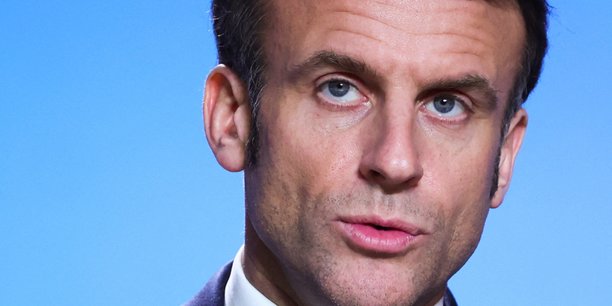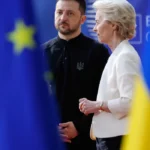President Emmanuel Macron and Italian Prime Minister Giorgia Meloni called on Friday for support for Tunisia, which is facing a serious financial crisis, in order to contain the “migration pressure” that this country represents for Europe.
President Emmanuel Macron and Italian Prime Minister Giorgia Meloni called on Friday for support for Tunisia, which is facing a serious financial crisis, in order to contain the “migration pressure” that this country represents for Europe.
“In Tunisia, the very great political tension, the economic and social crisis which is raging in the absence of an agreement with the International Monetary Fund, (are) very worrying”, declared Emmanuel Macron during a press conference at the from a European summit.
This “leads to a very great destabilization of the country and the region and to increased migratory pressure on Italy and the European Union”, he said, calling for “acting together” at European level to help the Tunisia and allow a “control of emigration”. “We must in the very short term succeed in stopping the migratory flows which leave Tunisia and increase (this) pressure”, insisted the French president, specifying to have spoken about it with the head of the Italian government during a bilateral meeting.
As a reminder, Tunisia, some portions of the coastline of which are less than 150 km from the Italian island of Lampedusa, very regularly records attempts to leave migrants, mostly from sub-Saharan African countries, to Italy. According to official Italian figures, more than 32,000 migrants arrived in Italy illegally from Tunisia in 2022.
President Kais Saied, in power since July 2021, sparked an outcry in February by denouncing the presence in Tunisia of “hordes” of illegal immigrants from sub-Saharan Africa and a “criminal enterprise” aimed, according to him, at changing demographics. from his country. Remarks which had provoked an increase in abuses against African migrants in the country, prompting the World Bank to suspend all new financing in early March to Tunisia, already mired in a serious financial crisis. Indebted to 80% of its GDP due in particular to the weight of its public service, Tunisia must resort to borrowing to make up its budget deficit. It is also negotiating a loan of nearly 2 billion dollars with the International Monetary Fund (IMF), which conditions other international aid including the European Union, but the talks are slipping.
Financially Stabilize The Region
Giorgia Meloni, evoking the fear of a “migratory wave”, explained having “addressed” the subject during the summit because “not everyone is perhaps aware of the risks created by the situation in Tunisia”. Asked about a possible Italian-French mission to Tunisia with the European Commissioner for Home Affairs Ylva Johansson, she replied: “Yes, there is a mission at the level of foreign ministers, there are several at the moment who are return to Tunisia.
“If we do not tackle these problems adequately, there is a risk of seeing an objectively unprecedented wave of migration unleash,” said Giorgia Meloni, whose far-right government is following an anti-migrant line.
She also discussed the situation in Tunisia with the European Commissioner for the Economy Paolo Gentiloni, who “will be going there in the coming days”. “Work at the diplomatic level must be done to convince the two parties, the IMF and the Tunisian government, to conclude an agreement to stabilize the region financially,” she stressed. The head of European diplomacy, Josep Borrell, for his part warned on Monday that the situation in Tunisia was “very dangerous”, even mentioning a risk of “collapse” of the State likely to “cause migratory flows towards EU and cause instability in the MENA region” (Middle East and North Africa). “The European Union cannot help a country unable to sign an agreement with the International Monetary Fund,” he said. “President Kais Saied must sign with the IMF and implement the agreement, otherwise the situation will be very serious for Tunisia”.
An analysis described as “disproportionate” and rejected by Tunis.
Closevolume_Off
At the beginning of the year, the Governor of the Central Bank of Tunisia Marouane Abassi warned that the year 2023 would be “complicated”, in a context of weak growth (less than 3%), high inflation (more than 10%) and high unemployment (more than 15%), without a quick agreement with the IMF for a loan.
This article is originally published on latribune.fr







